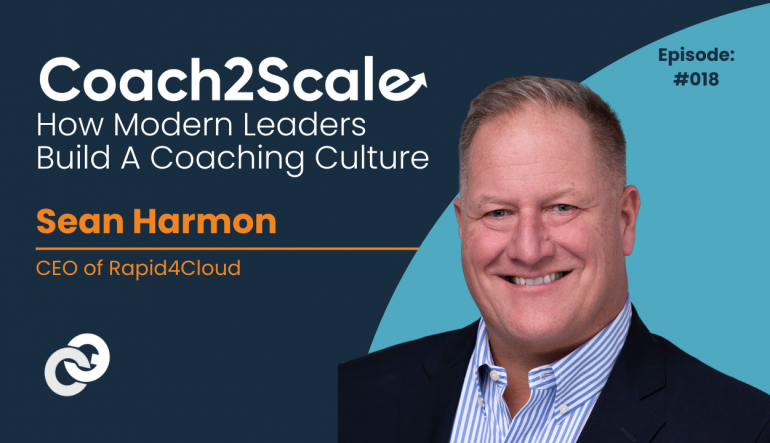In this episode of Coach2Scale, author, professor, and board advisor Rachel Pacheco joins host Matt Bonelli to unpack one of the most overlooked drivers of sales performance: meaning. Drawing from her research and experience working with fast-scaling startups and MBA students alike, Rachel challenges the myth that salespeople are only motivated by money or perks. Instead, she shows why helping reps find purpose in their day-to-day work leads to deeper engagement, higher productivity, and better retention, and why frontline managers have the greatest influence over that outcome.
You’ll hear practical ways to coach for meaning, how to deliver feedback that builds self-awareness and performance, and why micromanagement isn’t the real problem, meaninglessness is. Rachel shares coaching tactics for time-strapped managers, explains the risks of cookie-cutter motivation strategies, and outlines how structured 1:1s can become high-trust development conversations. Whether you’re a CRO, frontline manager, or enablement leader, this episode will help you rethink how to build a culture where performance and purpose go hand-in-hand.
What Rachel Pacheco Taught Us About Coaching for More Than Just Performance Metrics
It’s easy to think that performance is just about process, pipeline, and pressure. But if that were true, we wouldn’t see so many reps burn out, churn out, or quietly coast toward mediocrity despite all the tools, trainings, and dashboards we’ve thrown at them. The truth is, many reps aren’t underperforming because they don’t know what to do; they’re underperforming because they don’t understand why it matters.
That’s the insight Rachel Pacheco brought to our latest episode of Coach2Scale. Rachel’s not only a professor at Georgetown and author of Bringing Up the Boss, she’s also been on the inside of fast-scaling startups trying to get messy management cultures under control. In our conversation, she broke down the science and psychology behind why meaning, not just motivation, is what drives sustained sales performance. And how managers are often the missing link.
Here’s what every CRO should take away from this conversation and what your managers need to hear from you.
1. Reps Don’t Need a Life Purpose, They Need Day-to-Day Meaning
You don’t need a yoga retreat to find meaning at work. According to Rachel, we’re thinking about “purpose” too narrowly. What drives rep engagement isn’t some grand, existential mission statement; it’s knowing how today’s work connects to something that matters: to their team, their goals, or their growth. Meaning happens in the micro, not just the macro.
For CROs, this reframes how we define “engagement.” It’s not about offsites or pep talks. It’s about whether reps feel their work is seen, useful, and connected to progress.
2. Managers Are the Bridge Between Work and Meaning
Managers aren’t just performance enforcers; they’re interpreters. The best ones connect the dots between tasks and impact. They explain why that sales deck matters, how that call moved the business forward, or how a rep’s effort supported the broader team strategy.
But too many managers avoid this because they’re overwhelmed, undertrained, or unsure how to have those conversations. That’s not a rep problem, it’s a leadership one. And it’s a problem we can solve.
3. Stop Coaching to the Forecast, Coach to the Skills That Drive It
We talked about this on the pod: deal coaching is important, but it’s not enough. If all your managers are doing is reviewing pipeline or inspecting the forecast, you’re coaching to outcomes, not the inputs that drive them.
Rachel made this distinction clear: coaching should focus on behavior, not just results. That’s where you shape reps into better problem-solvers, communicators, and operators. That’s what creates scale, not just better close rates next quarter, but stronger reps across every quarter.
4. One Size Does Not Motivate All
If your managers are offering the same incentives and feedback to every rep, they’re missing the mark. Rachel broke down how motivation types differ. Some reps thrive on recognition, others on autonomy, others on challenge.
This is where coaching gets personal. The best managers ask, “Why do you come to work each day?” and listen carefully. When they align goals and development with what personally matters to the rep, performance becomes a byproduct, not a demand.
5. Great Feedback Isn’t Platitudes, It’s Precision
A “great job” isn’t feedback. Rachel walked us through how meaningful feedback isn’t about compliments, it’s about clarity. “Here’s what you did well. Here’s the impact. Here’s what you can apply moving forward.” That’s what sticks. That’s what builds confidence. And that’s what creates a loop of accountability and improvement.
If your managers aren’t equipped to do that, then feedback becomes noise. Or worse, it becomes a source of disengagement.
6. Coaching Without Time or Tools Isn’t a Strategy, It’s a Wish
Rachel’s biggest point wasn’t philosophical. It was operational. Managers want to coach. But they don’t have time, structure, or visibility into the data they need to do it well. Coaching becomes something they try to squeeze in between pipeline reviews and firefighting.
And that’s exactly where CoachEm comes in.
When managers use data to coach the right rep on the right behavior at the right time, coaching becomes a lever, not a burden. It’s not about holding more meetings; it’s about having better ones. That’s what drives performance that lasts longer than an SPIFF.
Final Thought: Don’t Leave Meaning to Chance
If your revenue engine depends on reps showing up strong every day, you can’t afford to treat meaning as optional. It’s not fluff. It’s a multiplier.
Your frontline managers hold the keys, but they need support. They need coaching themselves. They need tools that strip away guesswork and help them focus where it matters. Because when reps find meaning in their work, they bring more of themselves to it.
And when that happens, quota becomes a floor, not a ceiling.
🎧 Listen to the full episode:
“Meaning Drives Motivation: What Managers Are Missing”
Available now on Apple, Spotify, and YouTube.
Want to see how CoachEm helps managers create coaching moments that actually move the needle? Book a demo here.






